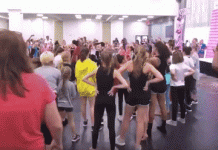 One of the biggest barriers you can face as a teacher or studio owner is making sure that you and your students’ parents are on the same page. Most of the time these issues come from the fact that both you and the parents want the best for the children as they grow as dancers and people. It can be incredibly frustrating to disagree with the people that can be your (and your dancers’) biggest supporters, but it isn’t impossible to work to develop a productive, happy, and sustainable relationship with your dance parents. Just like the dancers, their parents are part of your dance family.
One of the biggest barriers you can face as a teacher or studio owner is making sure that you and your students’ parents are on the same page. Most of the time these issues come from the fact that both you and the parents want the best for the children as they grow as dancers and people. It can be incredibly frustrating to disagree with the people that can be your (and your dancers’) biggest supporters, but it isn’t impossible to work to develop a productive, happy, and sustainable relationship with your dance parents. Just like the dancers, their parents are part of your dance family.
Be a Communicator
Effective communication is key to having a positive relationship with your dance parents. Conflicts are often created because of miscommunication. Communicating clearly helps prevent unnecessary conflicts.
Be Open
Defensive behavior does not promote happiness or positivity. The best way to discourage defensive behavior is to appear or behave in a non-threatening manner. If you are receptive and open to other’s opinions and feelings, they will be open and receptive yours.
Provide Useful and Helpful Criticism
If a parent wants a child to do something they may not be ready or suited for, a simple no might not be an adequate answer. No matter what a parent is asking, even if you cannot fulfill their request, present information and criticism (usually of the student’s performance) is a kind, helpful, and tactful way.
Mind Your “Dance Business”
Gossip is not a productive activity. Do not gossip about your dancers, their parents, or anyone else. Professionalism is key. Gossip will only get you in trouble.
Stick to Your Rules
It might feel like making exceptions will make people happier. However, breaking your own rules will only lead parents to make bigger and more extreme requests. Get comfortable with what your rules are and why you have set them. Then stick to them.
End on a Positive Note
Whether a situation is positive or negative, it is important to end with positivity. You have probably heard of the old rule to never go to bed angry. This rule is about resolving negative situations so they can’t weigh on your and others involved. Never leave the studio angry. Every conversation, lesson, meeting, etc. should end on a positive note. Express your willingness to help and to work toward better outcomes.













